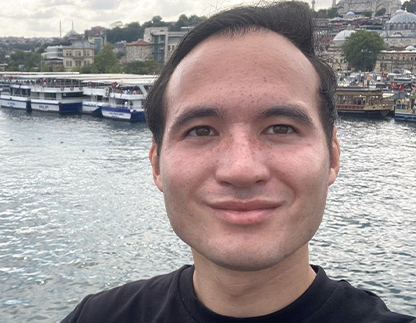You never know where you’re going to find inspiration or new ways of thinking about your subject.”
Emerson Murray
PhD Candidate in the Department of Political Science

Emerson Murray is a PhD candidate in Political Science in the Weinberg College of Arts and Sciences. His research examines migration and border politics within the ‘Anglosphere,’ focusing on how the United Kingdom and its former settler colonies—Australia, Canada, New Zealand, and the United States—historically and presently collaborate on migration policy. Emerson was awarded a fellowship from the Social Sciences and Humanities Research Council of Canada.
How would you describe your research and/or work to a non-academic audience?
I study the politics of migration and borders in the so-called ‘Anglosphere’: a community of English-speaking states whose ‘core’ is typically understood to include the United Kingdom and its former settler colonies, namely Australia, Canada, New Zealand, and the United States. My research, which is funded by the Social Sciences and Humanities Research Council of Canada as well as the Buffett Institute of Global Affairs at Northwestern, looks at the entanglement of the Anglosphere states’ migration and border regimes with one another historically and in the present.
I’m interested in how these states have recurringly cooperated in the governance of migration and how they’ve collaborated and learned from each other in developing strategies of migration and border management – how they “share notes,” so to speak. I’m further interested in how these forms of cooperation and exchange reflect longer histories of empire.
Tell us what inspired your research and/or work.
I lived in the United Kingdom from 2017 to 2020 – a tumultuous time in the country’s politics as it was in the midst of negotiations with the European Union over Brexit, with uncertainty and anxiety over national identity looming large. I was struck by the frequency with which British officials and politicians were seeming to take inspiration for post-Brexit policy proposals from Britain’s former settler colonies, such as the ‘points-based immigration system,’ which Canada, Australia, and New Zealand adopted in their respective moves away from ‘Whites-only’ immigration policies in the latter twentieth-century, along with the much-debated ‘Canada-style’ and ‘Australia-style’ EU free trade deals.
Not long after I left the UK, news emerged of controversial arrangements British officials were making to process and resettle asylum seekers in Rwanda, resembling longstanding (and widely criticized) Australian practices in Nauru and Papua New Guinea. Yet these apparent convergences between Britain and its former settler colonies were, I’d come to realize, only the tip of the iceberg, and my research seeks to understand the breadth and diversity of transnational linkages that have emerged between these states and their migration and border regimes.
Why Northwestern?
I applied to Northwestern first and foremost because of the Department of Political Science’s pluralistic approach to inquiry. Within the United States, Northwestern’s department stands out for its receptiveness to both mainstream and less orthodox, more critical research traditions. As a PhD student here, I’ve been able – and encouraged – to ask the kinds of questions and take up the kinds of projects that I would have been told to steer clear from elsewhere. The excellent resources and great location only made the decision easier!
How do you unwind after a long day?
I like to go running – a hobby I picked up during the pandemic lockdowns and have kept at since starting the PhD, with the Chicago North Shore being perfect for it. I also love to cook and have been taking advantage of the city’s great international markets.
What advice would you give your younger self or someone considering a similar path?
Read widely. You may have settled on whatever specialized topic you’re going to work on, but you’ll still benefit from knowing what’s happening in other areas of your discipline and beyond – you never know where you’re going to find inspiration or new ways of thinking about your subject. Even if your interests put you on the ‘margins’ of your discipline and what it deems to be its core intellectual concerns, it’s good to be attuned to the kinds of assumptions, categories, and framings that recur across its various debates and are often taken for granted. That’s where, indeed, I think you can start to ask some very interesting questions.
Tell us about a current achievement or something you're working on that excites you.
Just this summer I was awarded a grant from the Buffett Institute of Global Affairs at Northwestern to carry out exploratory fieldwork for my dissertation. With the grant I was able to spend seven weeks at different archives across the United Kingdom, including the National Archives in London, the Labour History Archive in Manchester, and the Conservative Party Archives in Oxford, where I looked at records on British immigration policy from the post-war decades to the early Blair years.
My visit turned up a wealth of material – most of which I still have to go through and analyze! – that’s drawn my attention to new aspects of my topic, including the role of the former settler colonies in inspiring practices of ‘medical bordering’ (through, for example, migrant health checks or medical inadmissibility rules) in Britain in the late twentieth and early twenty-first centuries.
Publish Date: November 5, 2024
If you know a graduate student, postdoctoral scholar, graduate faculty member, staff member, or a member of our TGS alumni population who would make a great candidate for our TGS Spotlight Series, please complete this brief TGS Spotlight Series Nomination Form.